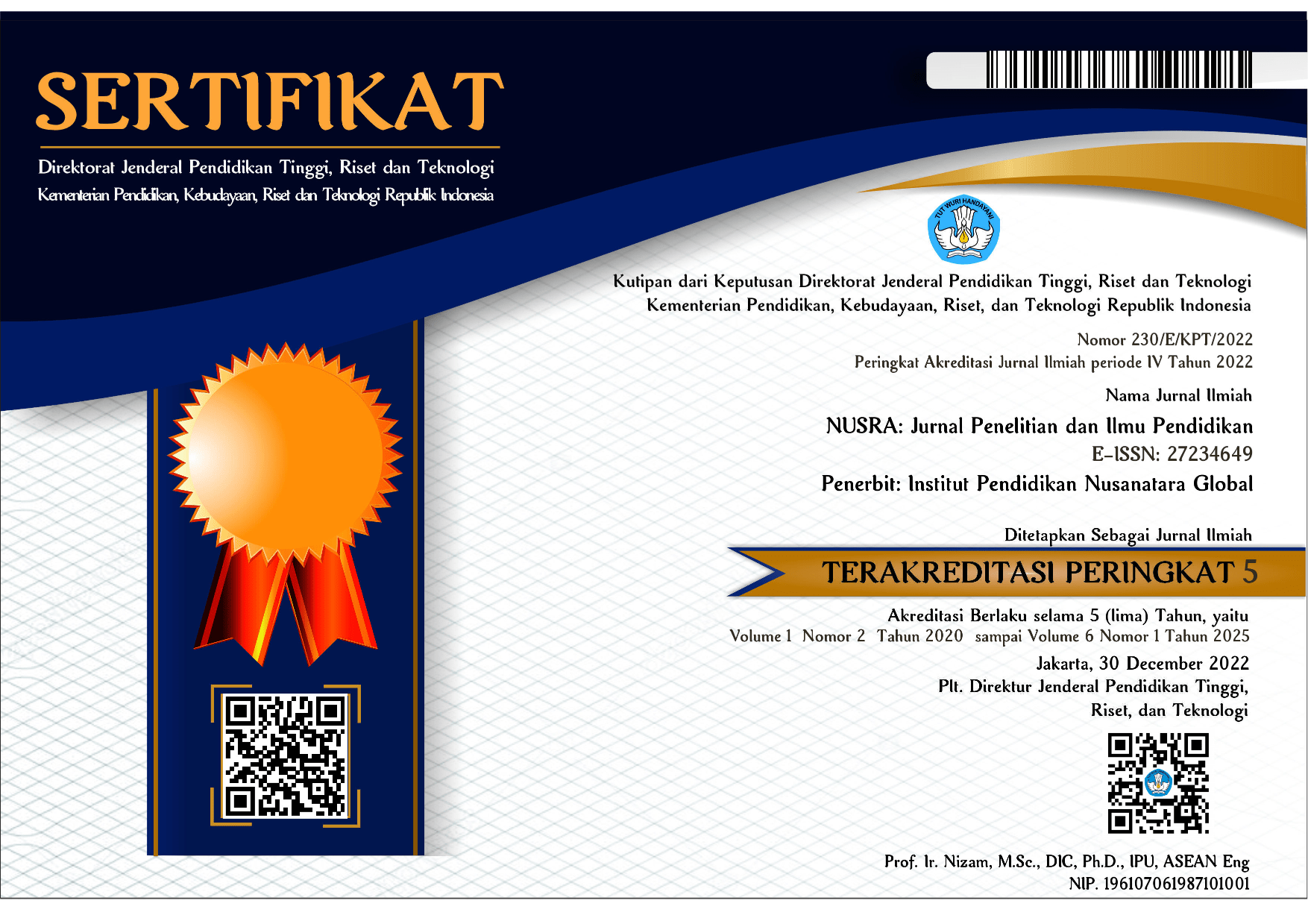PSYCHOLOGICAL FACTORS TOWARDS SPEAKING ABILITY AT THE FIRST SEMESTER OF ENGLISH DEPARTMENT STUDENTS IN UNDIKMA
DOI:
https://doi.org/10.55681/nusra.v4i4.1830Keywords:
Psychological Factors, Speaking, Low of Motivation and Unwillingness to CommunicateAbstract
This study was meant to analyze the psychological factors that influence the speaking ability of first semester students of English Department students in UNDIKMA, Mataram, West Nusa Tenggara Province. Psychology is the study of the nature of the human soul as well as its process. Psychology deals with the study of external behavior using objective observation methods for stimulation. In addition, there are some psychological factors that hinder students from speaking in English classes such as fear of making mistakes, shyness, anxiety, lack of confidence and lack of motivation. Those factors were commonly caused by their fear of being laughed at by their friends. Some psychological factors such as shyness and anxiety are considered as the main causes of students' reluctance to speak. This study was conducted in a qualitative approach. The population of this research was taken from A and B Classes from the first semester students of English Department students in UNDIKMA, Mataram, West Nusa Tenggara Province. The sample of the study consisted of 30 students. The researchers determined some techniques as the data sources, namely observation, documentation, field notes and tests or interviews. The researchers found that the psychological factors that contribute toward students' speaking abilities are as follows: students who have a fear of making mistakes, shame, anxiety, have low self-confidence, and those have low motivation will make them reluctant to speak in English because they found difficulties in speaking English.
Downloads
References
Brown, H.D. 2007. Principles of Language Learning and Teaching. San Francisco State University: Pearson Education, Inc, All Right Reserved.
Collins, D., Button, A., Richards, H. 2011. Performance Psychology A Practitioner’s Guide. UK: Elsevier Limited. All rights reserved.
Haidara, Y. 2016. Psychological Factor Affecting English Speaking Performance for the English Learners in Indonesia. Universal Journal of Educational Research. no.4 (2016): 1501.
Huberman, Miles, M. 1994. Data Management and Analysis Methods, In N. K. Denzin and Y.S Lincoln (Eds.): Thousand Oaks, CA: Sage.
Juhana, 2012. Psychological Factors That Hinder Students from Speaking in
English Class (A Case Study in a Senior High School in South Tangerang, Banten, Indonesia). Journal of Education and Practice, no.12 (2012): 101.
Kikwawila Study Group. 1994. Qualitative Research Methods. UNDP/WORLD BANK/WHO Special Programme for Research and Training in Tropical (TDR).
Pawlak, M., Klimczak, E.W., Jan Majer. 2011. Speaking and Instructed Foreign Language Acquisition. Canada: Multilingual Matters.
Raab, M., Lobinger, B., Hoffmann, S., Pizzera, A., Laborde, S. 2016. Performance Psychology Perception, Action, Cognition, and Emotion. UK: Elsevier Inc. All rights reserved.
Richard, J.C. 2006. Developing classroom speaking activities: From theory to practice. Guidelines RELC: Singapore.
Rudolph F. Verdeber, Deanna D. Sellnow, Kathleeen S. 2006. The Challenge of Effective Speaking. Boston, USA: Wadsworth, Cengage Learning.
Thornbury, S. 2005. How To Teach Speaking. Amazon: Pearson Education ESL.
Yin, R.K. 2011. Qualitative Research from Start to Finish. The Guilford Press New York London.
Downloads
Published
How to Cite
Issue
Section
License
Copyright (c) 2023 NUSRA: Jurnal Penelitian dan Ilmu Pendidikan

This work is licensed under a Creative Commons Attribution-ShareAlike 4.0 International License.














